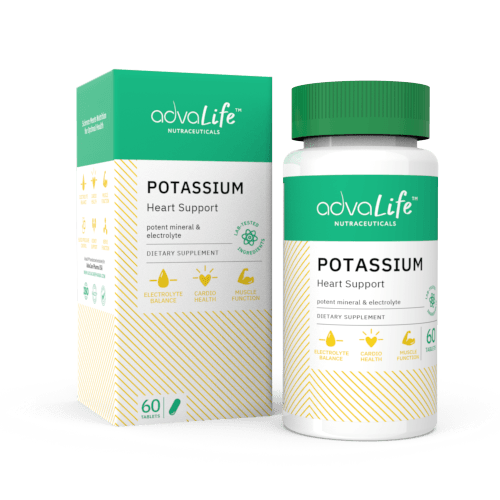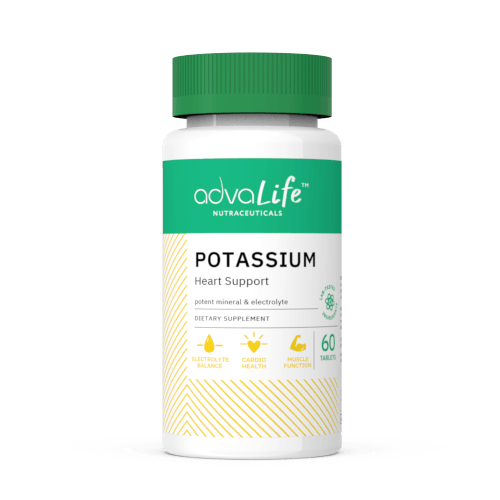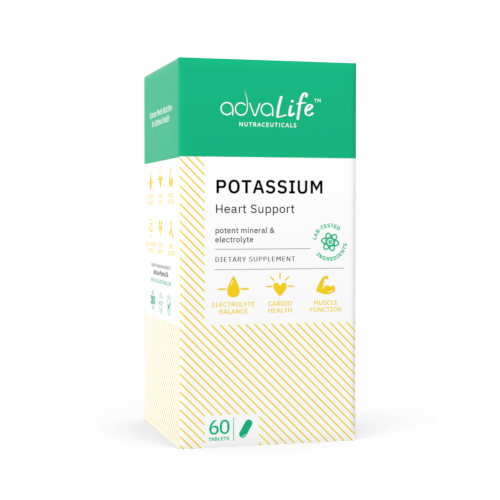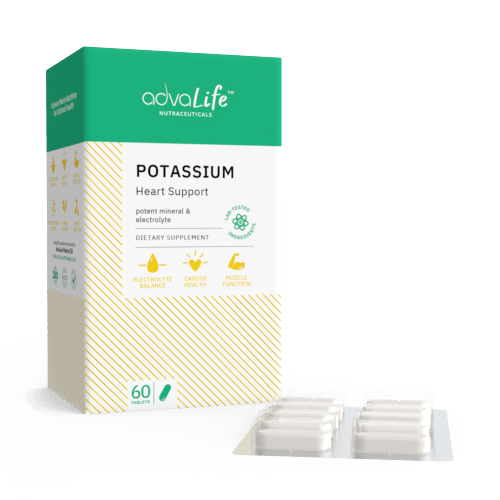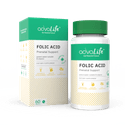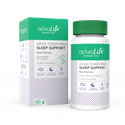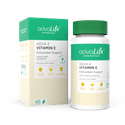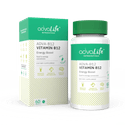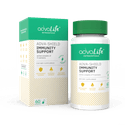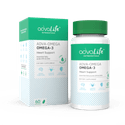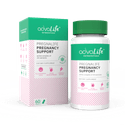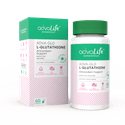- Home›
- Supplements›
- Tablet Supplements›
- Potassium Tablets
Potassium Tablets
What are Potassium Tablets?
Potassium tablets are supplements that provide a rich source of pure potassium, an essential mineral, and electrolytes that play a crucial role in numerous physiological functions. Potassium aids in the maintenance of proper hydration and fluid balance, the regulation of blood pressure, and the promotion of healthy nerve and muscle function.
This potassium supplement is also available in capsule form.
All of AdvaCare Pharma's potassium supplements are manufactured under strict ISO/HACCP guidelines at certified locations in the USA, China, and India. This ensures conformity with industry standards for health, safety, and environmental protection throughout production. We guarantee quality by conducting a comprehensive vetting process for all our suppliers before allowing them to supply raw materials.
Why are we a quality Potassium Tablets manufacturer?
AdvaCare Pharma USA is an experienced manufacturer of Potassium Tablets. Our commitment to providing superior potassium supplements is reflected in our adherence to ISO 22000, 9001 & HACCP standards.
As a top potassium supplement manufacturer, our AdvaLife™ brand understands that the success of our supplement distributors is crucial to providing consumers with high-quality products that they can rely on.
Composition
AdvaLife™ Potassium Tablets
Per Serving: Potassium: 99mg (Serving Size: 1 tablet)
AdvaLife™ Potassium Capsules
Per Serving: Potassium: 99mg (Serving Size: 1 capsule)
Targeted Health Support
Benefits
Potassium benefits the fluid balance
The human body consists of 60% water. Almost 40% is found inside the cells, and it is called intracellular fluid, while the remainder is found in the extracellular spaces. The amount of water in the intracellular and extracellular spaces is affected by potassium and sodium levels. Potassium determines the amount of water inside the cells, and a proper balance between potassium and sodium is needed.
This mineral can lead to normal osmolarity and can prevent conditions like dehydration that affect the heart and the kidneys.
Potassium benefits the nervous system
This mineral can be beneficial in transmission of nerve impulses and can regulate muscle contractions, heartbeat, reflexes, and other body functions. Nerve impulses are generated by sodium ions moving into cells and potassium ions moving out of cells. This activates the nerve impulse. Drops in the blood levels of potassium can affect the body’s ability to generate a nerve impulse. This supplement might lead to healthy nerve function.
Potassium benefits the muscle and heart contractions
This supplement can lead to normal muscle contractions. Proper potassium levels are required for normal nerve function and muscle contractions. It also leads to normal blood pumping to the brain, organs, and muscles. This supplement can help in cases of heart arrhythmia and irregular heartbeat.
Potassium benefits the cardiovascular health
This supplement can positively affect the factors that lead to irregular heart function. A potassium-rich diet can reduce blood pressure and can help the body remove excess sodium. Studies show that 1,285 participants from the age of 25 to 64 years old can have reduced blood pressure due to normal potassium levels.
Potassium benefits in cases of strokes
Professionals advise eating potassium-rich diets to prevent strokes. This supplement can lead to normal blood flow to the brain. According to studies, people who follow a potassium-rich diet can have a 24% lower risk of strokes than people who do not eat a potassium-rich diet.
Potassium benefits in bone health
This supplement can prevent hollow and porous bones. This supplement can also prevent osteoporosis and can reduce calcium loss in the body.
Potassium benefits kidney health
This supplement lowers the calcium levels in the urine, which is the main mineral that leads to kidney stones. This can be achieved with potassium supplementations and also a diet that includes potassium.
Potassium benefits the urinary health
This supplement can increase urine production and can reduce sodium levels. This can lead to reduced water retention.
Ingredients
Potassium is a mineral supplement that helps regulate the body's fluid levels, blood pressure, and muscle contractions. It is important for nerve function and energy production and can help maintain heart health.
In addition to its important roles in fluid balance, blood pressure regulation, and muscle contractions, potassium has been found to have potential benefits in promoting bone health. It may help reduce the risk of osteoporosis by increasing calcium retention and reducing the loss of calcium in urine.
Moreover, potassium has been found to have potential benefits in reducing the risk of stroke. It may help lower blood pressure, reduce the risk of blood clots, and improve blood flow to the brain by relaxing blood vessels.
Uses
What are Potassium Tablets used for?
- maintain fluid balance in the body
- regulate blood pressure
- enhance nerve and muscle function
How are Potassium Tablets used?
This potassium supplement is to be consumed with water and taken preferably with food.
What dose of Potassium should be taken?
The recommended dosage of potassium is 1 tablet, one to five times daily, or as directed by a healthcare practitioner.
Do not exceed the recommended daily dose. A laxative effect may occur in case of overdose.
Are there any lifestyle or dietary recommendations to enhance the effectiveness of this Potassium supplement?
People who suffer from potassium deficiency should have a balanced diet to experience the desired effects. This supplement is contained in many foods, including sweet potato, spinach, salmon, peas, bananas, beet greens, pinto beans, avocado, etc. Also, people should have regular physical activity while taking this supplement.
Can only Potassium be used for treating heart arrhythmia?
It depends on the severity of the case. If the changed heartbeat is due to potassium deficiency, this supplement can be enough for the treatment process. There are many causes that can lead to heart arrhythmia, and it is important to consult with a cardiologist. These doctors can determine the cause and prescribe the needed therapy and supplements.
What symptoms can be treated with Potassium?
This electrolyte is used to treat potassium deficiency like hypokalemia. It can address problems with kidneys that have reduced filtration, and extreme fatigue. This mineral can also treat muscle spasms, weakness, or cramping. It can also contribute to normal cardiovascular function and can treat gastrointestinal problems like constipation, nausea, and vomiting.
How can potassium deficiency be detected?
This condition is usually detected and diagnosed with blood tests. Doctors can also order electrocardiograms and arterial blood gas tests to measure the pH levels in the human body.
Can overdose occur with this supplement?
Like with any supplement, overdose can occur with excessive consumption of potassium. Risk factors for potassium overdose include kidney diseases, prolonged exercise, and potassium-conserving diuretics. If you take any diuretics at the moment, contact a professional to provide you with advice. Cocaine use can also lead to potassium overdose. Diabetic patients also have an increased risk of potassium overdose. Chemotherapy can also increase the chances of potassium overdose.
The most common side effect of potassium overdose is abnormal heartbeat (arrhythmia), and it can lead to death if not treated on time.
Mild cases of potassium overdose might have gastrointestinal adverse effects. This includes laxative effects and vomiting. This condition often passes by unnoticed.
Is this supplement a substitute for some food?
This supplement is not a substitute for any food. Patients who take this product should not rely just on it. Potassium is an essential mineral and electrolyte that is contained in many fruits (bananas, kiwi, oranges, pineapples, and apricots) and many vegetables (leafy greens, carrots, and potatoes). This electrolyte can be also consumed through lean meats, whole grains, beans, and nuts. Patients who have problems with potassium deficiency should consume this product through a balanced diet.
Can Potassium be used during pregnancy and breastfeeding?
Yes, this supplement can be used during pregnancy and breastfeeding, but consult with a doctor before including it in your daily diet. Potassium can have many benefits for both the mother and the infant.
How should this supplement be stored?
This supplement should be stored in a dry and cool place and away from sunlight. Keep this supplement out of reach of children and pets.
Target Consumer Segments
- Adults With Electrolyte Imbalance (30–60): individuals requiring potassium supplementation for managing low potassium levels due to diet, medications, or dehydration
- Hypertensive Patients and Cardiac Risk Groups (45–70): men and women managing blood pressure and cardiovascular function through potassium support for vascular health
- Athletes and Physically Active Individuals (18–40): fitness enthusiasts and sports professionals seeking electrolyte replenishment and muscle function support
- Older Adults on Diuretics or Medication (60+): seniors prone to potassium loss due to chronic conditions or long-term diuretic use
- Patients With Kidney or Adrenal Conditions (35–65): individuals under medical supervision needing therapeutic potassium intake as part of renal or adrenal care
- General Wellness Users in Hot Climates (25–55): consumers in regions with high fluid loss risk, seeking hydration balance and muscle cramp prevention through potassium
Regional Consumer Demand
North America
Market Insight: Increasing awareness of cardiovascular health and electrolyte balance drives steady demand. Recommended Dosage: Standard Formula in 120 units/box — supports clinical applications in managing hypertension and heart health.
Europe
Market Insight: Preventive care and regulatory focus on mineral supplementation sustain consistent use. Recommended Dosage: Standard Formula in 60 units/box — aligns with dietary supplementation standards for daily wellness.
Middle East
Market Insight: Rising incidence of hypertension and diabetes fuels need for mineral balance products. Recommended Dosage: Standard Formula in 60 units/box — ensures effective electrolyte replenishment for at-risk populations.
Latin America
Market Insight: Growing sports nutrition and healthcare channels boost demand for potassium-based supplements. Recommended Dosage: Standard Formula in 60 units/box — practical for affordability and regular supplementation across broad demographics.
Southeast Asia
Market Insight: Expanding middle-class adoption of preventive supplements supports market growth. Recommended Dosage: Standard Formula in 60 units/box — suitable for daily supplementation while maintaining cost-effectiveness.
East Asia
Market Insight: High consumer preference for mineral-rich formulations enhances demand in urban centers. Recommended Dosage: Standard Formula in 120 units/box — matches clinical-grade expectations and lifestyle-driven supplementation.
South Asia
Market Insight: Prevalence of nutrient deficiencies and cardiovascular issues sustain long-term demand. Recommended Dosage: Standard Formula in 60 units/box — addresses widespread dietary gaps with therapeutic-strength support.
Africa
Market Insight: Public health priorities focus on managing nutrient deficiencies and chronic conditions. Recommended Dosage: Standard Formula in 60 units/box — affordable dosage tailored for accessibility and preventive healthcare initiatives.
Precautions
Supplementing with Potassium Tablets may lead to side effects. The most common side effects occur due to an overdose. It includes gastrointestinal upset. If you suspect overdose reactions, consult with a healthcare provider.
Do NOT use Potassium Tablets if you:
- are hypersensitive to potassium.
- have a medical condition, such as liver or kidney disease.
Before taking any supplements, consult with a doctor or pharmacist about the possible interactions of this product with other pharmaceuticals.
FAQs
What is the MOQ (minimum order quantity) for wholesale purchases?
The minimum order quantity (MOQ) for wholesale purchases of AdvaLife™ supplements may differ based on factors such as the specific product, formulation, and dosage form. Typically, MOQs for our supplement products fall within the range of 5,000 to 10,000 units. Nonetheless, we offer flexibility in batch sizes thanks to our adaptable production processes.
Can you detail the available packaging options for supplements?
AdvaLife™ offers a diverse range of packaging options tailored to accommodate various supplement dosage forms. Our extensive lineup includes bottles for liquids like syrups and drops, as well as bottle and blister packing options for tablets and capsules. These options are designed to cater to the specific preferences and requirements of different markets.
Do you offer bulk discounts for large orders of supplement products?
AdvaLife™ understands the importance of providing competitive pricing for bulk orders of supplement products. We provide reduced prices and discounts for sizable production batches, which can result in lower costs per unit. This allows our distributors to maintain profitability while offering our premium-quality supplements at competitive prices in the market.
What certifications do your supplement products have?
AdvaLife™ ensures that its supplement products meet rigorous standards by obtaining ISO, HACCP, BRC, NSF, and/or Halal certifications. Our commitment to quality extends to our diverse production lines, each tailored to meet the certification and registration requirements of different countries.
What quality control documentation is available for your supplement products?
Our quality control processes for supplement products entail comprehensive testing at every stage of production. From sourcing raw materials to final product analysis, we maintain meticulous records of ingredient testing, in-process checks, and manufacturing protocols. Our documentation ensures transparency and adherence to stringent regulatory standards.
What are the extraction and purification processes used for supplement ingredients?
We employ a range of extraction and purification techniques tailored to each specific ingredient to ensure superior quality and efficacy. For instance, for herbal extracts, we utilize techniques such as supercritical CO2 extraction or solvent extraction followed by chromatography purification. Additionally, for marine-based ingredients like fish oil or krill oil, we employ molecular distillation to remove impurities and contaminants while preserving the beneficial compounds.
Can I get help with regulatory support for supplement product registration?
Our highly experienced Regulatory Affairs Department assists with all matters related to product registration. With thousands of medical products registered in more than 65 countries, our regulatory expertise ensures that product registration is completed efficiently.
References
What is the evidence for Potassium’s impact on cardiovascular health?
This supplement can positively affect the factors that lead to irregular heart function. A potassium-rich diet can reduce blood pressure and can help the body remove excess sodium.
Controlled trial of long-term oral potassium supplements in patients with mild hypertension
This study lasted 15 weeks and included controlled trials of oral potassium supplements in 37 patients with mildly increased blood pressure and a normal dietary intake of sodium.
By the third week of treatment, there was a notable decrease in blood pressure within the actively treated group compared to the placebo group, with the maximum reduction observed after 15 weeks. The group receiving potassium supplements experienced a significant increase in urinary potassium excretion, while there were no significant alterations in plasma sodium and potassium concentrations or urinary sodium excretion. Within a subgroup of 13 patients who continued treatment with oral potassium supplements at half the initial dose for an additional nine weeks, their blood pressure remained significantly lower compared to baseline values, although not compared to the placebo group.
The conclusion of the study is that moderate oral potassium supplementation is linked to a reduction in blood pressure among patients with mild hypertension over the long term.
Effects of Oral Potassium on Blood Pressure
The main objective of this study was to assess the effects of supplementation with oral potassium on blood pressure in humans. It included a meta-analysis of randomized controlled trials.
It included thirty-three randomized controlled trials with 2,609 participants in which potassium supplementation was the only difference between the intervention and control conditions. Using a random-effects model, data from individual trials were combined by weighting the results of each trial based on the inverse of its variance. One trial showed an unusually strong effect of potassium in reducing blood pressure. Upon exclusion of this trial, potassium supplementation was found to be linked with a significant decrease in mean systolic and diastolic blood pressure by -3.11 mm Hg and -1.97 mm Hg, respectively, with a 95% confidence interval. The effectiveness of treatment seemed to be heightened in studies where participants had a high intake of sodium concurrently.
The conclusion of the study is that elevated potassium intake should be viewed as a recommendation for both preventing and treating hypertension, particularly for individuals who struggle to lower their sodium intake.

You might be interested in...
Why AdvaCare Pharma?
As an industry leader, we are aware of our responsibility to provide affordable and sustainable solutions to improve healthcare worldwide.
